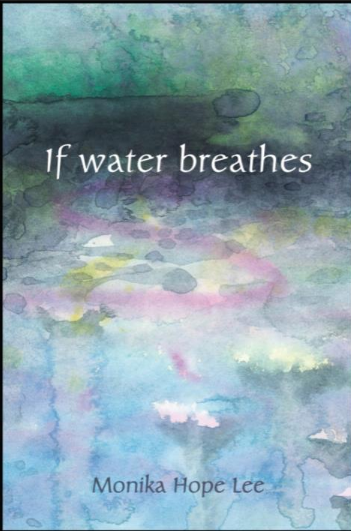 |
|
||
|
“One. Two. Breathe. All the words matter in Monika Lee’s marvelous If water breathes. Marvel at her
marvels: Clockless air. Souwesto’s sky being scanned. Jaipur becomes a bicycle. Bagpipes outstripping barbequing. Breathe in. Read her poems out loud and hear your voice in hers. Find your way to the angel words at the end. Breathe out and work your way back to the blackbird-poet at the start. Two. One. Breathe.” (JAMES STEWART REANEY, Arts and Entertainment Journalist and Critic). “If water breathes is a delight for the senses. Lyrical, rhythmic, often subtly rhymed, Monika Lee’s poems ripple in the ear, refreshing amid the aural flatness of a lot of contemporary free verse. Her images are vividly spare, ‘like a flurry of light’ letting the space between the words blossom with meaning, proof that indeed less can mean more. These are poems well worth reading and rereading for the pleasures of each moment.” (SUSAN IOANNOU, poet) “What I like best about these poems is their music, sometimes ornate, sometimes delicate, sometimes simple, yet always luminous with internal rhyme. . . . They have the individual quality of a series of music box tunes that delight in their variety and in their exquisite display. The imagery is at times like a shaken snow globe, or at times like a landscape viewed through a kaleidoscope, the resulting reader experience being an agitated renewal of the familiar or an exotic view of something new.” (JOHN B. LEE, poet laureate of Brantford) | |||
|
Interview with Monika Hope Lee
When did you start writing and what do you think attracted you to poetry? I started writing poetry when I was eight years old. My parents read poetry to us, and they even encouraged us to memorize poems. I learned all of Hamlet’s famous “To be or not to be” speech when I was nine years old; I didn’t know what it meant, but I knew that it was beautiful. Since that time I have been reading and writing poems. How did you make the decision to begin publishing? I won a couple of children’s poetry contests when I was young, and then I went underground for many years. I still wrote poetry but with no urge to share it. Then when my mother was diagnosed with a terminal cancer diagnosis, I began to publish -- partly for her, partly because life is short, and partly for professional reasons. How do you decide when something is ready to publish? That’s a good question. I don’t think I do know when it’s ready to publish a poem. That decision is usually made by the editors I submit to. When a piece is rejected, I tend to keep re-writing it until it is accepted. Does writing and publishing poetry fit well with your academic position as a literature professor? I think so, yes. Writing poems gives me an understanding of the writers I teach, of the creative process. However, sometimes academic writing and creative writing conflict with one another in my life. When one is going well, the other tends to stay on the back burner. I wish I had more time for creative work because it is so soul-nourishing. I’m fortunate to be at a university which values and credits creative publication. Tell me a little about the genesis of this new book of poems: If water breathes. It took much longer to write, compile, and edit this collection than I thought possible. Some of the poems have been re-worked many, many times. The shape of the volume changed continually. Finally, I had to hire a friend who is also an editor to help me with the ordering of the poems. I couldn’t see the forest for the trees. But it was worth all the re-writing – I’m happy with the end result. What would you like your reader to take away from this book? I would like my readers to understand how language can dip into the deepest aspects of the world, its meaning and its beauty. I would like readers to journey into and out of the book at leisure, maybe reading only one or two poems at a time. I’d like them to merge with their higher selves through reading poetry, mine or anyone else’s. | |||
| If water breathes | Purchase Information | Home |